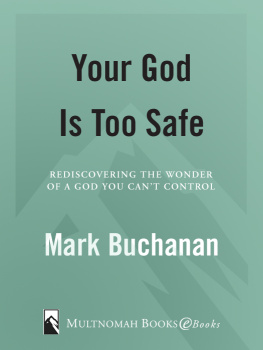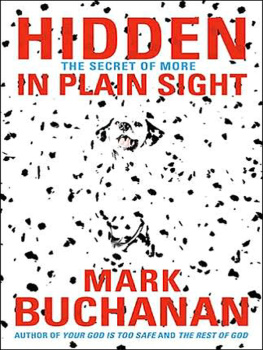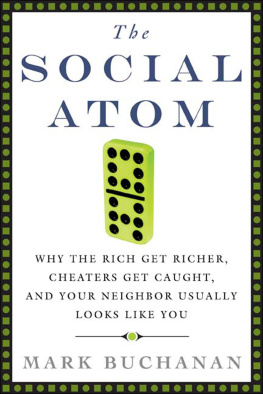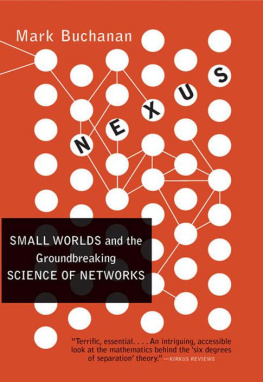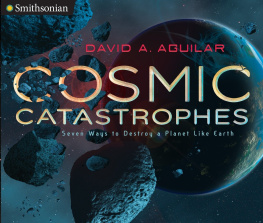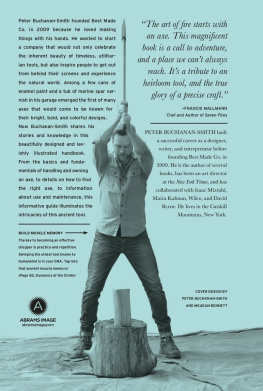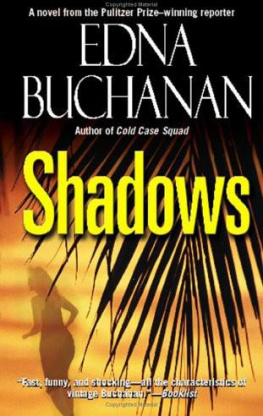Mark Buchanan - Ubiquity: Why Catastrophes Happen
Here you can read online Mark Buchanan - Ubiquity: Why Catastrophes Happen full text of the book (entire story) in english for free. Download pdf and epub, get meaning, cover and reviews about this ebook. year: 2002, publisher: Crown, genre: Romance novel. Description of the work, (preface) as well as reviews are available. Best literature library LitArk.com created for fans of good reading and offers a wide selection of genres:
Romance novel
Science fiction
Adventure
Detective
Science
History
Home and family
Prose
Art
Politics
Computer
Non-fiction
Religion
Business
Children
Humor
Choose a favorite category and find really read worthwhile books. Enjoy immersion in the world of imagination, feel the emotions of the characters or learn something new for yourself, make an fascinating discovery.

- Book:Ubiquity: Why Catastrophes Happen
- Author:
- Publisher:Crown
- Genre:
- Year:2002
- Rating:3 / 5
- Favourites:Add to favourites
- Your mark:
- 60
- 1
- 2
- 3
- 4
- 5
Ubiquity: Why Catastrophes Happen: summary, description and annotation
We offer to read an annotation, description, summary or preface (depends on what the author of the book "Ubiquity: Why Catastrophes Happen" wrote himself). If you haven't found the necessary information about the book — write in the comments, we will try to find it.
Ubiquity: Why Catastrophes Happen — read online for free the complete book (whole text) full work
Below is the text of the book, divided by pages. System saving the place of the last page read, allows you to conveniently read the book "Ubiquity: Why Catastrophes Happen" online for free, without having to search again every time where you left off. Put a bookmark, and you can go to the page where you finished reading at any time.
Font size:
Interval:
Bookmark:
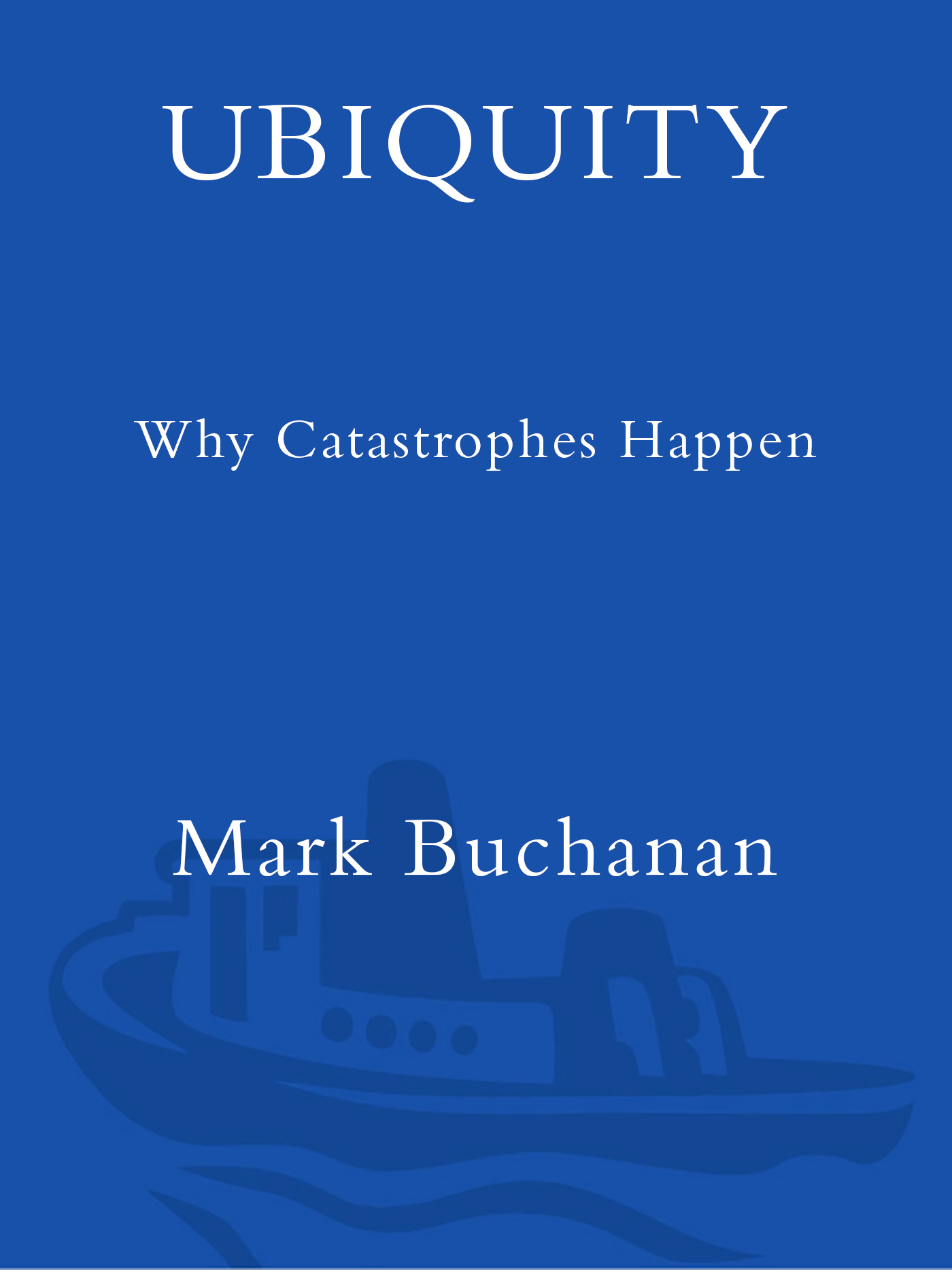
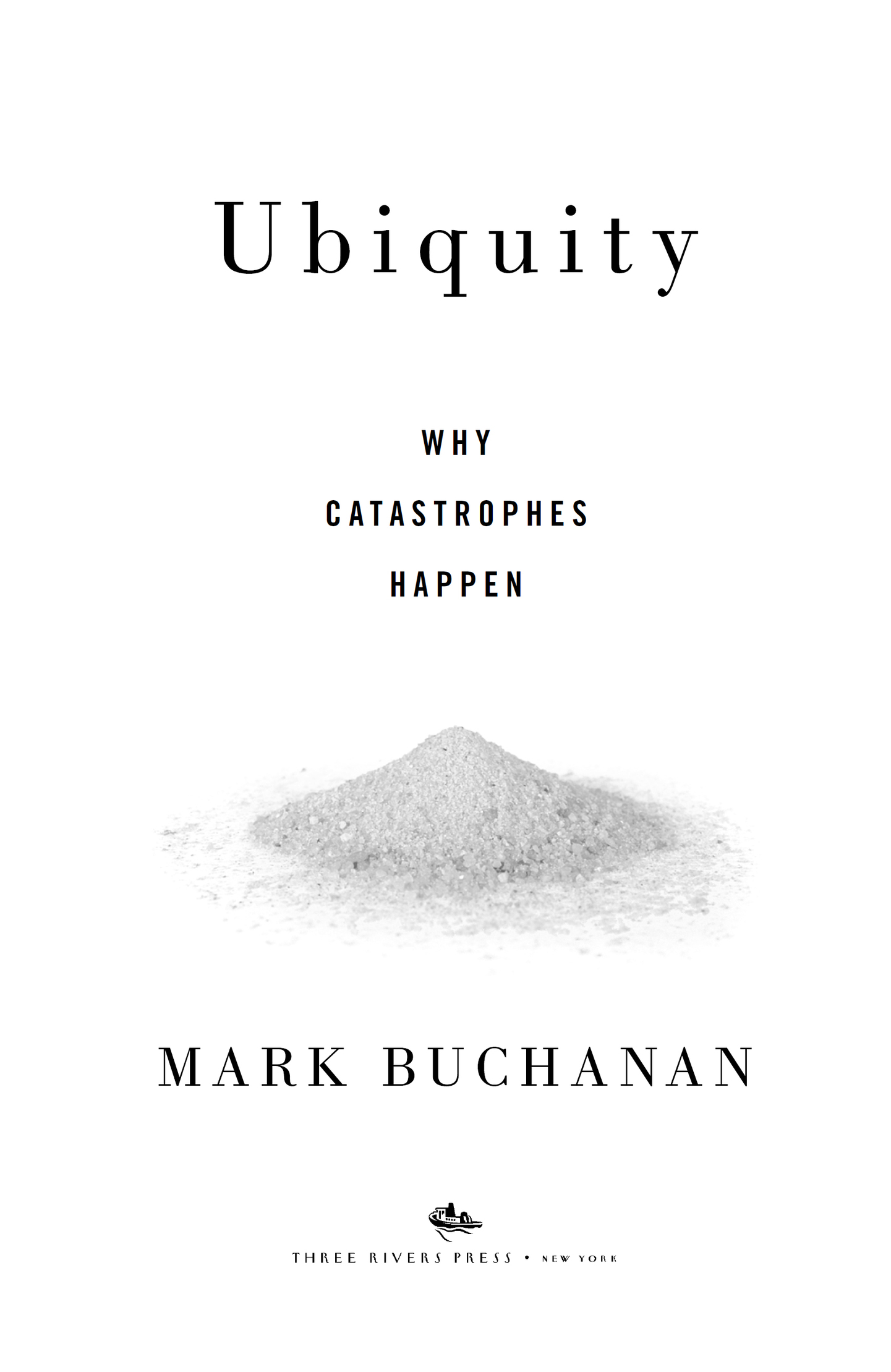
Copyright 2000, 2001 by Mark Buchanan
All rights reserved. No part of this book may be reproduced or transmitted in any form or by any means, electronic or mechanical, including photocopying, recording, or by any information storage and retrieval system, without permission in writing from the publisher.
Published by Three Rivers Press, New York, New York.
Member of the Crown Publishing Group, a division of Random House, Inc.
www.randomhouse.com
THREE RIVERS PRESS and the Tugboat design are registered trademarks of Random House, Inc.
Originally published in different form, in Great Britain, by Weidenfeld & Nicolson in 2000.
Library of Congress Cataloging-in-Publication Data
Buchanan, Mark.
Ubiquity / Mark Buchanan.
p. cm.
Includes bibliographical references and index.
1. Causality (Physics) 2. Pattern formation (Physical sciences) I. Title.
QC6.4.C3 B83 2001
530.01dc212001028365
ISBN9780609809983
Ebook ISBN9780609504321
v5.1_r1
a
To Kate, Nietzsche, and the Rabbit

I am grateful to the many scientists who have taken the time to read and offer comments on portions of this manuscript, and to others who have generously supplied me with figures, data, or useful bits of information. My thanks go out especially to Robert Geller, Christopher Scholtz, Lena Oddershede, Tom Witten, Paul Meakin, Jim Meiss, Kim Christensen, Stefano Zapperi, Leo Kadanoff, Dietrich Stauffer, James Binney, Mark Newman, Bruce Malamud, Jeffrey Lockwood, Roy Anderson, Michael Benton, William Clemens, Peter Yodzis, Gene Stanley, Thomas Lux, Parameswaran Gopikrishnan, Dirk Helbing, Sidney Redner, Gottfried Mayer-Kress, and Lewis Miller. No one should suppose, of course, that any of these researchers agree with everything or even most of what I have written here. Any errors or misconceptions that may have slipped into the text are mine alone.
I would also like to thank Peter Tallack at Weidenfeld & Nicolson and Emily Loose at Random House for their faith in the value of this project, and, most important, my wife Kate for her unflagging support and encouragement during the many months of writing.
Mark Buchanan

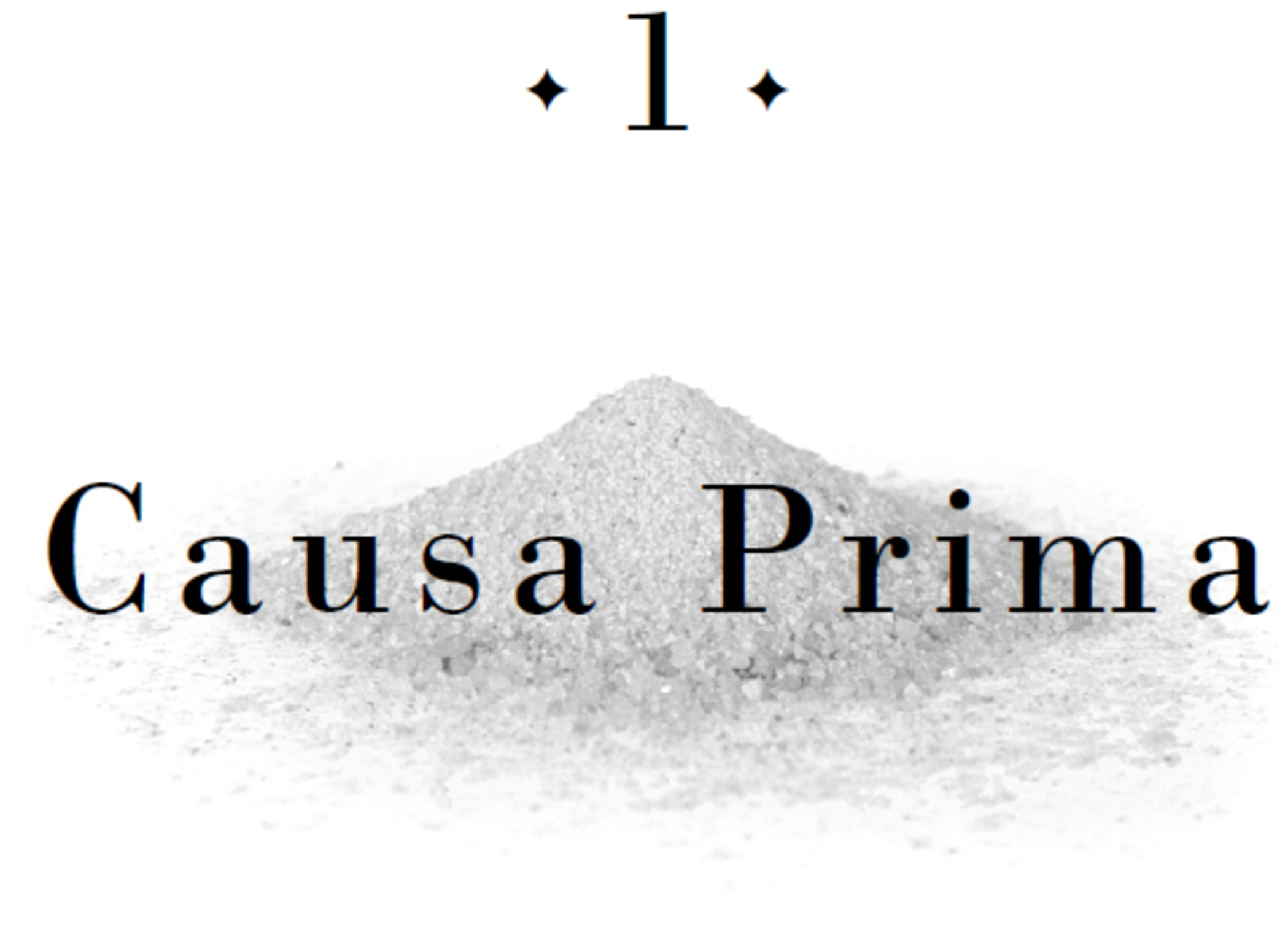
Politics is not the art of the possible.
It consists in choosing between the disastrous and the unpalatable.
JOHN KENNETH GALBRAITH
History is the science of things which are never repeated.
PAUL VALRY

It was 11 A . M . on a fine summer morning in Sarajevo, June 28, 1914, when the driver of an automobile carrying two passengers made a wrong turn. The car was not supposed to leave the main street, and yet it did, pulling up into a narrow passageway with no escape. It was an unremarkable mistake, easy enough to make in the crowded, dusty streets. But this mistake, made on this day and by this driver, would disrupt hundreds of millions of lives, and alter the course of world history.
The automobile stopped directly in front of a nineteen-year-old Bosnian Serb student, Gavrilo Princip. A member of the Serbian terrorist organization Black Hand, Princip couldnt believe his luck. Striding forward, he reached the carriage. He drew a small pistol from his pocket. Pointed it. Pulled the trigger twice. Within thirty minutes, the Austro-Hungarian Archduke Franz Ferdinand and his wife Sophie, the carriages passengers, were dead. Within hours, the political fabric of Europe had begun to unravel.
In the days that followed, Austria used the assassination as an excuse to begin planning an invasion of Serbia. Russia guaranteed protection to the Serbs, while Germany, in turn, offered to intercede on Austrias behalf should Russia become involved. Within just thirty days, this chain reaction of international threats and promises had mobilized vast armies and tied Austria, Russia, Germany, France, Britain, and Turkey into a deadly knot. When the First World War ended five years later, ten million lay dead. Europe fell into an uncomfortable quiet that lasted twenty years, and then the Second World War claimed another thirty million. In just three decades, the world had suffered two engulfing cataclysms. Why? Was it all due to a chauffeurs mistake?
On the matter of the causes and origins of the First World War, of course, almost nothing has been left unsaid. If Princip touched things off, to the British historian A.J.P. Taylor the war was really the consequence of railway timetables, which locked nations into a sequence of military preparations and war declarations from which there was no escape. The belligerent states, as he saw it, were trapped by the ingenuity of their preparations. It is worth keeping in mind, of course, that all this historical explanation has arrived well after the fact.
In considering how well we understand the natural rhythms of human history, and in judging how able we are nowadays to perceive even the rough outlines of the future, it is also worth remembering that the century preceding 1914 had been like a long peaceful afternoon in European history, and that to historians of the time the wars seemed to erupt like terrifying and inexplicable storms in a cloudless sky. All the spawn of hell, the American historian Clarence Alvord wrote after the First World War, roamed at will over the world and made of it a shambles.The pretty edifice ofhistory, which had been designed and built by my contemporaries, was rent asunder.The meaning we historians had read into history was false, cruelly false. Alvord and other historians thought they had discerned legitimate patterns in the past, and had convinced themselves that modern human history would unfold gradually along more or less rational lines. Instead, the future seemed to lie in the hands of bewildering, even malicious forces, preparing unimaginable catastrophes in the dark.
The First World War, the war sparked by the most famous wrong turning in history, is the archetypal example of an unanticipated upheaval in world history, and one might optimistically suppose that such an exceptional case is never likely to be repeated. With the aid of hindsight, many historians now believe they understand the larger forces that caused the world wars of the twentieth century, and that we can once again see ahead with clear vision. But Alvord and his colleagues had similar confidence a century ago. Whats more, few of usprofessional historians includedseem any wiser when it comes to the present.
In the mid-1980s, the Union of Soviet Socialist Republics had existed for nearly three-quarters of a century, and it stood as a seemingly permanent fixture on the world stage. At that time, there were palpable fears in the United States that the U.S.S.R. was way ahead militarily, and that only with a concerted effort could the United States even stay competitive. In 1987, one would have had to scour the journals of history and political science to find even a tentative suggestion that the U.S.S.R. might collapse within half a century, let alone in the coming decade. Then, to everyones amazement, the unthinkable became a realityin just a few years.
Font size:
Interval:
Bookmark:
Similar books «Ubiquity: Why Catastrophes Happen»
Look at similar books to Ubiquity: Why Catastrophes Happen. We have selected literature similar in name and meaning in the hope of providing readers with more options to find new, interesting, not yet read works.
Discussion, reviews of the book Ubiquity: Why Catastrophes Happen and just readers' own opinions. Leave your comments, write what you think about the work, its meaning or the main characters. Specify what exactly you liked and what you didn't like, and why you think so.


